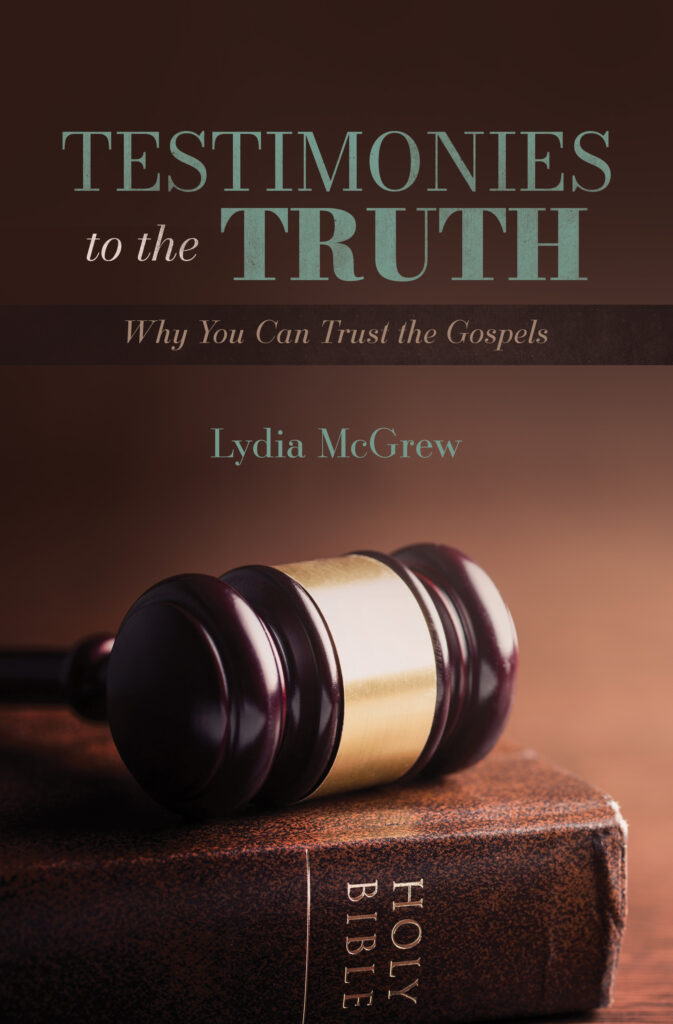I recently came across the work of Christian apologist Lydia McGrew who has written and broadcast on what she calls ‘Undesigned Co-incidences’ as supporting evidence for the veracity of the New Testament. Here is a link to a video in which she explains what this is all about and defends the idea.

Lydia describes herself as a widely published analytical philosopher and author, and wife of philosopher and apologist Timothy McGrew. What does she mean by the term undesigned coincidences? Essentially, she seems to mean where two different descriptions or phrases about the same event are found in different books of the New Testament (particularly the Gospels and Book of Acts) and the descriptions overlap and/or complement each other in a way that is evidentially supportive. She talks about ‘Making common sense rigorous‘ a phrase I like very much.
One of the things that supports my faith is the way that Scripture-both individual books and the whole collection that makes up the Bible- just seems to hang together and make sense more than any other narrative I have encountered. This is very real to me but I can see that sceptics would write this off as subjectivism, wish fulfilment etc, so ideally we need someone skilled in the analysis of words and language to clarify and quantify. We humans need clarification, not least as opponents are always trying to muddy the waters, and very often succeeding.
If the Scriptures are from God, and God wishes to be understood, and they are presented to enable reasonable people to believe, then you would expect that God, the author of language, should make sure enough that the Scriptures, in fair translations, are sufficiently understandable to enable an honest seeker to find enough to support a sincere faith without committing intellectual suicide. This idea is sometimes called the The Perspicuity (or clarity) of Scripture. And if Scripture is true, we would also expect bad actors, men and devils, to be constantly trying to undermine, misrepresent and confuse-and of course this is what we do see, as in 2 Timothy 3:1-9, The Letter of Jude, 2 Peter 2:1-3 etc.
Lydia has written a book about this concept as applied to the veracity of New Testament as near-contemporary eyewitness statements rather than fiction that was invented at a much later date as opponents allege.

She describes the book thus:
>>>Christians should be prepared to defend and share their faith, even while wrestling with doubts and questions that arise from within and without. With thousands of books out there-not to mention content on social media-where do we start? Testimonies to the Truth, my fourth book on New Testament reliability, provides a great starting point. I bring together new arguments and old ones in a form that is readily accessible to laymen while being careful and rigorous. With these arguments in hand, you will never be stumped when someone asks, “Why should I believe what the Bible says about the life and teachings of Jesus?” Above all, I point to Jesus himself, true God and true man, the One who teaches, loves, and suffers for us, described by the Gospels in vivid and credible detail. Including suggested study and discussion questions and references for further reading and research, this book is an excellent resource for personal study, Sunday School, high school and college classes, and small groups.<<<
The idea of undesigned co-incidences seems a useful line of argumentation in response to those who say that the New Testament, particularly the Gospels, were simply fiction and were made up by some shadowy group years after the supposed events. Several examples are given in a series of short videos by her husband Timothy, basically connections between names and places, and sayings of Jesus which are stated in an incomplete but complementary manner of 2 different sources. This is like real life.
The example is given of two witness to a robbery, one of whom mentions that she saw the robber trip as he ran away, another mentioning that she saw he had one shoelace undone but does not mention the trip. Each account is different, but each is fully true as far as it goes and they support each other in an evidentially positive way. And remember the classic Japanese film Rashomon where we hear several accounts of the same events from different protagonists, each of whom saw only part of the truth.
Trivial discrepancies between different witness accounts add to credibility. If the stories about Jesus had been falsely invented by some unidentified shadowy group, as atheists often assert, they would have produced only one authoritative gospel, not four.
She rightly says that this is only one of several possible lines of apologetic argument, and is open to question, but taken together, many such interesting coincidences tend to support the traditional view that the early New Testament books were written in good faith by people who saw something really big and important actually happen, and not a conspiracy cobbled together later.
From the apologetics I have seen and done in my 40 plus years as a Christian, I am sure that no apologetics or reasoning however sound will persuade those who are determined not to believe. After all, some of Our Lord’s opponents refused to believe in Him even after he fulfilled multiple Messianic Scriptures in their sight and raised people from the dead. As He said to them ‘You snakes! You vipers! How will you escape the judgement of Hell?’ I once argued with a man, a doctor, who said he would rather go to Hell than bow before God, ever if God appeared to him. You can’t help some people.
Apologetics is important. Mere Christianity was massively important to me as a new believer when my faith immediately came under intellectual attack. It didn’t make me a Christian, but it helped me to stay one. As Lewis said, apologetics is not the whole story: first of all you have to have the evangelist, his heart and words on fire for the Gospel. But having heard the Gospel presented, there are questions that honest sceptics deserve to have answered, and also false arguments and disinformation from dishonest sceptics, of whom I fear there are many, which need to be disarmed. At least, as Lewis wrote somewhere (I think in one of his letters) it is essential that Christians have learned and visible philosophers and other experts in our camp, so that the less learned humble believer-who accepts the Gospel like a little child but lacks the intellect and learning to process it all intellectually-can feel ‘Ah, well they may have some clever people on their side, but so do we.’
Some will say that this is all so much arguing about words. Well, words communicate meaning, and truth and lies both exist, and it matters. If we are interested in pursuing truth and avoiding deception, we cannot help but argue about words. So, this is a shout out for the McGrews and all who labour in ‘the army of translators’ that C S Lewis earnestly hoped would carry on his efforts to make Christ known and understood after he had sailed into the West.